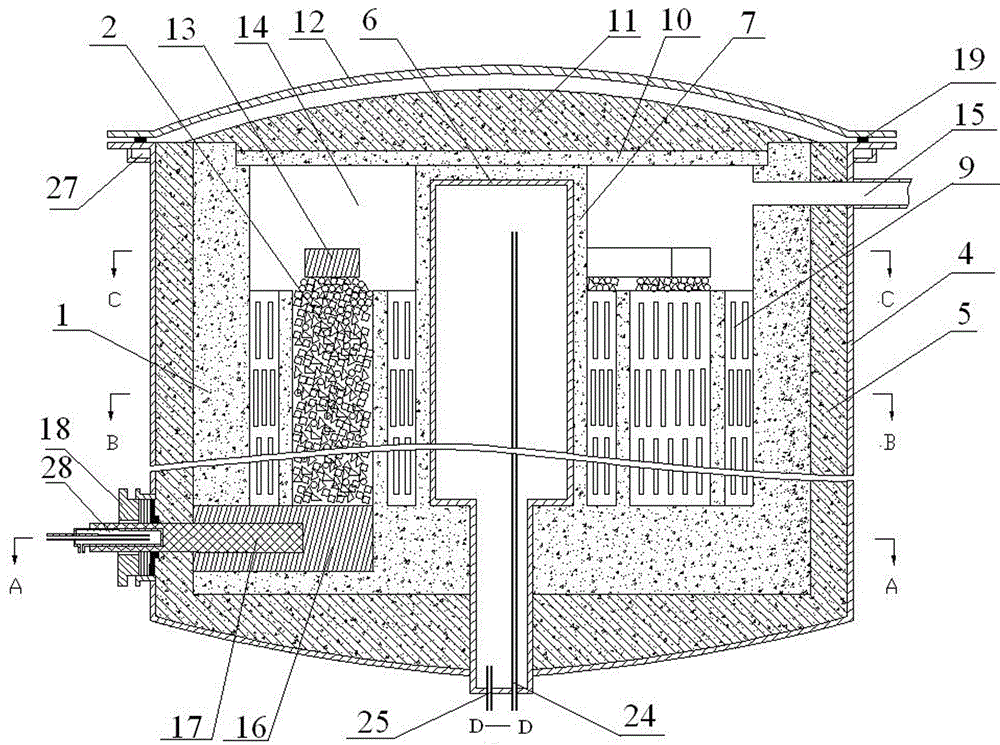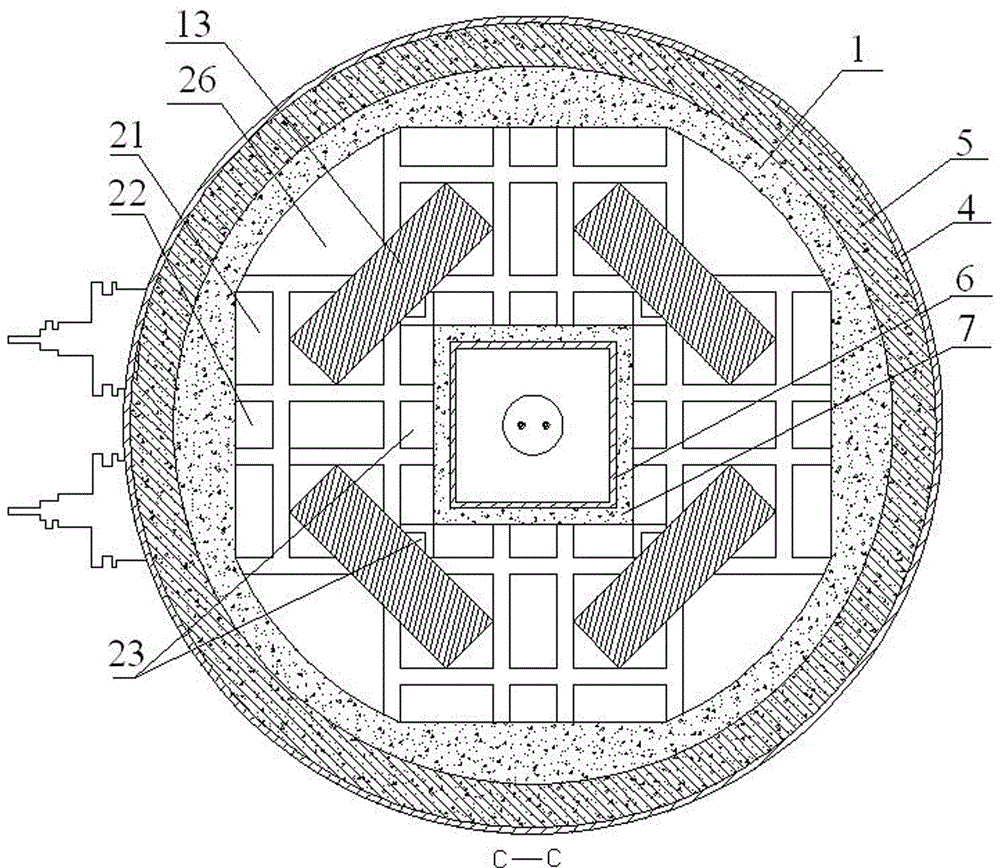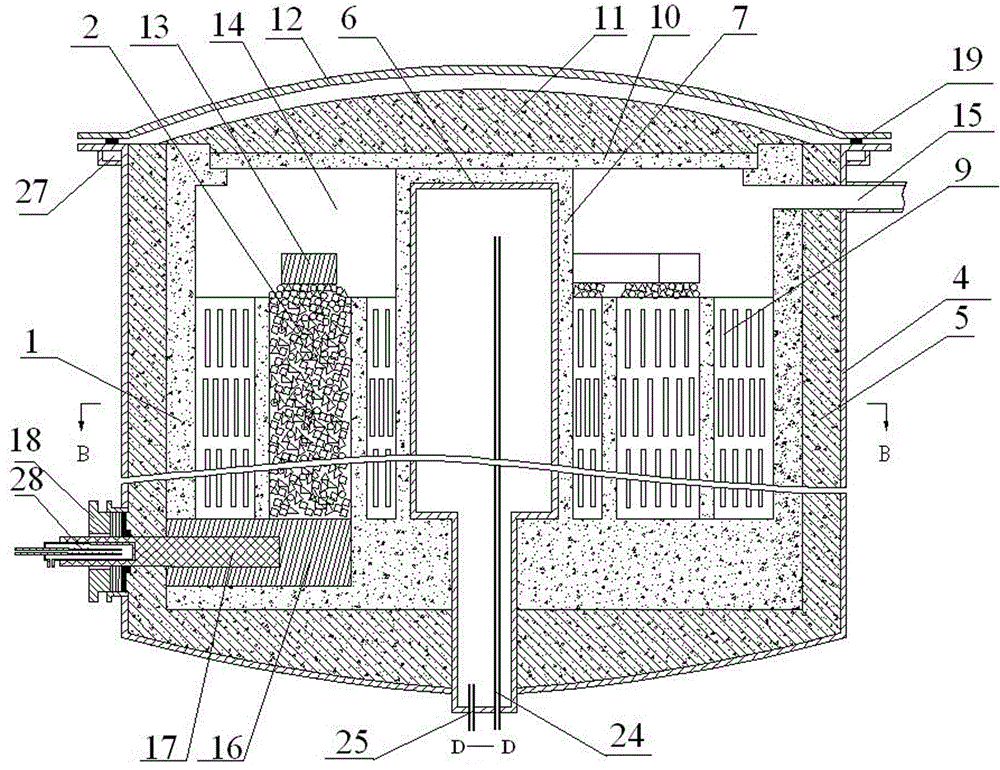Resistance furnace for separating and recycling aluminum reduction cell lining solid waste and petroleum coke for desulfurization
An aluminum electrolytic cell and solid waste technology, which is applied in the metallurgy and environmental fields, can solve the problems of uneven heating current distribution, low and high temperature of the conductive current resistance heating body, and the cross section cannot be too large, so as to expand the loading capacity of a single furnace, The effect of uniform axial current distribution, improved production efficiency and separation effect
- Summary
- Abstract
- Description
- Claims
- Application Information
AI Technical Summary
Problems solved by technology
Method used
Image
Examples
Embodiment 1
[0074] Figure 1 shows the structure of the resistance furnace for separation and recovery of aluminum electrolytic cells lined with solid waste and petroleum coke desulfurization, the structure of the A-A surface is shown in Figure 2, the B-B surface structure is shown in Figure 3, and the C-C surface structure is shown in Figure 4 ;Including furnace shell (4), spherical crown furnace cover (12), furnace lining (5), barrel refractory concrete masonry (1), refractory concrete roof (10), insulation cover plate (11) and two graphite The electrode (16); the furnace shell (4) and the spherical crown furnace cover (12) are made of steel plates, the top of the furnace shell (4) is provided with a cooling water jacket (27), and the top of the furnace shell (4) is connected with the spherical crown furnace Vacuum gaskets (19) are set between the covers (12) for sealing connection; the inner wall of the furnace shell (4) is connected to the furnace lining (5), and the furnace lining (5) ...
Embodiment 2
[0081] The structure of the electric resistance furnace for separating and recycling aluminum electrolytic cell lining solid waste and petroleum coke desulfurization is shown in Figure 5, and the B-B surface structure is shown in Figure 6, and the structure is the same as in Example 1, except that:
[0082] Barrel-type refractory concrete masonry (1) The outer wall and inner wall are both barrel-shaped, and the horizontal section of the external well-type auxiliary material room formed between the well-type main material room and the barrel-type refractory concrete masonry is non-rectangular.
Embodiment 3
[0084] The structure of the resistance furnace for separation and recovery of aluminum electrolytic cells lined with solid waste and petroleum coke desulfurization is shown in Figure 7, the structure of the A-A surface is shown in Figure 8, the structure of the B-B surface is shown in Figure 9, and the structure of the C-C surface is shown in Figure 10 ; Structure is the same as embodiment 1, and difference is:
[0085] Barrel-type refractory concrete masonry (1) The horizontal cross-sections of the outer wall and inner wall are polygonal, and the horizontal cross-sections of each well-type main material room and each well-type auxiliary material room are square or rectangular.
PUM
 Login to View More
Login to View More Abstract
Description
Claims
Application Information
 Login to View More
Login to View More - R&D
- Intellectual Property
- Life Sciences
- Materials
- Tech Scout
- Unparalleled Data Quality
- Higher Quality Content
- 60% Fewer Hallucinations
Browse by: Latest US Patents, China's latest patents, Technical Efficacy Thesaurus, Application Domain, Technology Topic, Popular Technical Reports.
© 2025 PatSnap. All rights reserved.Legal|Privacy policy|Modern Slavery Act Transparency Statement|Sitemap|About US| Contact US: help@patsnap.com



